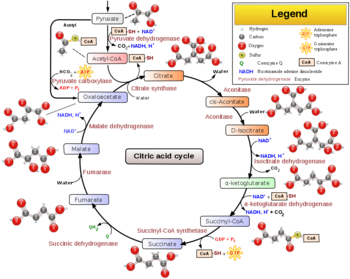We apologize for Proteopedia being slow to respond. For the past two years, a new implementation of Proteopedia has been being built. Soon, it will replace this 18-year old system. All existing content will be moved to the new system at a date that will be announced here.
Citric Acid Cycle
From Proteopedia
(Difference between revisions)
| Line 6: | Line 6: | ||
*[[Krebs cycle overview]] | *[[Krebs cycle overview]] | ||
*[[Krebs cycle reactions]] | *[[Krebs cycle reactions]] | ||
| - | The [[Citric Acid Cycle]] (tricarboxylic acid cycle) is a series of enzyme catalyzed reactions which are critical in cellular respiration. Under oxidative conditions, pyruvate continues to be metabolized through the tricarboxylic acid cycle. In this cycle, Acetyl-CoA, a byproduct of [[glycolysis]], along with various cofactors, are broken down into carbon dioxide, water, and energy in the form of GTP and NADH. | + | The [[Citric Acid Cycle]] (tricarboxylic acid cycle) is a series of enzyme catalyzed reactions which are critical in cellular respiration. Under oxidative conditions, pyruvate continues to be metabolized through the tricarboxylic acid cycle. In this cycle, Acetyl-CoA, a byproduct of [[glycolysis]], along with various cofactors, are broken down into carbon dioxide, water, and energy in the form of GTP and NADH. |
'''Pyruvate decarboxylation or pyruvate oxidation''', also known as the link reaction (or oxidative decarboxylation of pyruvate), is the conversion of pyruvate into Acetyl-CoA by the enzyme complex pyruvate dehydrogenase complex (see [[Pyruvate dehydrogenase]]). | '''Pyruvate decarboxylation or pyruvate oxidation''', also known as the link reaction (or oxidative decarboxylation of pyruvate), is the conversion of pyruvate into Acetyl-CoA by the enzyme complex pyruvate dehydrogenase complex (see [[Pyruvate dehydrogenase]]). | ||
Revision as of 11:49, 15 September 2022
Proteopedia Page Contributors and Editors (what is this?)
Alexander Berchansky, David Canner, Ann Taylor, Wayne Decatur, Jaime Prilusky

